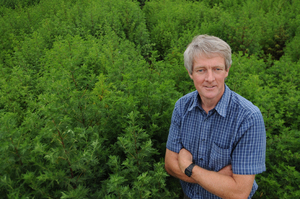Onion variety ‘Vision’ wins NIAB Award
 The National Institute of Agricultural Botany has awarded its Variety Cup to the onion variety Vision bred by Syngenta Seeds.
The National Institute of Agricultural Botany has awarded its Variety Cup to the onion variety Vision bred by Syngenta Seeds.
NIAB chief executive Dr Tina Barsby presented the award to Syngenta’s onion and leek product specialist Nigel Kingston and product business manager Michel Bremaud, at the UK Onion and Carrot Conference and Exhibition’s Gala Dinner in Peterborough.

 UK crop researchers have significantly increased the yields of a leading anti-malaria remedy that could eventually benefit malaria sufferers worldwide.
UK crop researchers have significantly increased the yields of a leading anti-malaria remedy that could eventually benefit malaria sufferers worldwide.